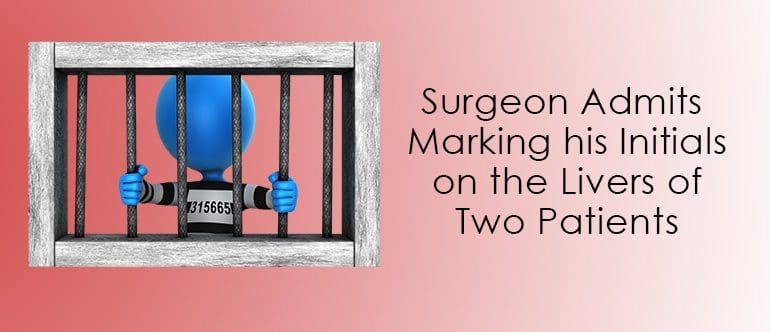Call us toll-free: 800-878-7828 — Monday - Friday — 8AM - 5PM EST

Simon Bramhall pleads guilty to two counts of assault after using argon gas to sign ‘SB’ on patients’ organs
By Frances Perraudin for The Guardian
A surgeon has pleaded guilty to marking his initials on the livers of two patients while performing transplant surgery.
In a hearing at Birmingham crown court on Wednesday, Simon Bramhall admitted two counts of assault by beating relating to incidents on 9 February and 21 August 2013. He pleaded not guilty to the more serious charges of assault occasioning actual bodily harm.
The renowned liver, spleen and pancreas surgeon used an argon beam, used to stop livers bleeding during operations and to highlight an area due to be worked on, to sign his initials into the patients’ organs. The marks left by argon are not thought to impair the organ’s function and usually disappear by themselves.
The 53-year-old was first suspended from his post as a consultant surgeon at Birmingham’s Queen Elizabeth hospital in 2013 after a colleague spotted the initials “SB” on an organ during follow-up surgery on one of Bramhall’s patients.
The following summer, while an internal disciplinary investigation into his conduct was ongoing, Bramhall tendered his resignation. Speaking to the press at the time, he said marking his initials on to his patients’ livers had been a mistake.
“I had a disciplinary meeting on 15 May. I was not dismissed,” he said. “I made the decision on 16 May I would hand in my notice. It is a bit raw and I have to move on.”
Speaking after Bramhall’s suspension, Joyce Robins, of Patient Concern, said: “This is a patient we are talking about, not an autograph book.”
Sitting at the back of the court on Wednesday, Bramhall, wearing a pink shirt and dark suit, spoke to confirm his name and to confirm to the judge that he understood the proceedings. He was granted unconditional bail and will be sentenced on 12 January.
Prosecuting, Tony Badenoch told the court that it was a “highly unusual and complex case, both within the expert medical testimony served by both sides and in law. It is factually, so far as we have been able to establish, without legal precedent in criminal law.
“The pleas of guilty now entered represent an acceptance that that which he did was not just ethically wrong but criminally wrong. They reflect the fact that Dr Bramhall’s initialing on a patient’s liver was not an isolated incident but rather a repeated act on two occasions, requiring some skill and concentration. It was done in the presence of colleagues.”
Badenoch concluded: “It was an intentional application of unlawful force to a patient whilst anaesthetised. His acts in marking the livers of those patients were deliberate and conscious acts … It will be for others to decide whether and to what extent his fitness to practise is impaired.”
Ordering new victim impact statements and a pre-sentencing report, the judge Paul Farrer QC said the case concerned the “damage that was done to the surface of the liver” and not the emotional damage caused to the patients.
Elizabeth Reid, of the Crown Prosecution Service, said Bramhall’s actions were an abuse of the trust placed in him by the patients.
“It was an intentional application of unlawful force to a patient whilst anaesthetised,” she said. “His acts in marking the livers of those patients, in a wholly unnecessary way, were deliberate and conscious acts on his part.”
In February 2017, Bramhall was issued with a formal warning by the General Medical Council, which said his conduct had not met the standards required of a doctor.
“It risks bringing the profession into disrepute and it must not be repeated,” it said at the time. “Whilst this failing in itself is not so serious as to require any restriction on Mr Bramhall’s registration, it is necessary in response to issue this formal warning.”
On Wednesday the GMC said it was standard practice to look into any criminal conviction handed to a doctor.
Bramhall received media attention in 2010 when he successfully performed transplant surgery using a liver that had been salvaged from a plane that crashed in foggy conditions at Birmingham airport.
Following reports of Bramhall’s suspension, his former patient Tracy Scriven told the Birmingham Mail that the surgeon should be immediately reinstated. “Even if he did put his initials on a transplanted liver, is it really that bad? I wouldn’t have cared if he did it to me. The man saved my life,” she said.
